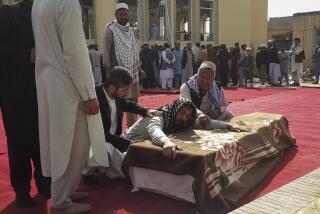U.S., Afghan Allies Play Down Rift on Punishing Taliban
- Share via
WASHINGTON — U.S. officials scrambled Friday to paper over an apparent split with their allies in the new Afghan government over how leaders of the crumbling Taliban regime should be treated after their capture.
One day after the new interim government chief, Hamid Karzai, ignited an outcry in Washington by suggesting that he might grant amnesty to Taliban leader Mullah Mohammed Omar, U.S. officials reached Afghan leaders to stress their strong view that top Taliban figures should not be treated leniently.
Karzai abruptly shifted his position, declaring in an interview Friday that Omar had reneged on a promise to denounce terrorism and would be arrested if caught.
Haron Amin, the Washington liaison for the Northern Alliance opposition group, said that U.S. officials had contacted members of the incoming government and that he had been called by the Pentagon. There is, he insisted, firm agreement that “there can be no compromise on treatment of the Taliban” leadership.
Pentagon spokeswoman Victoria Clarke said U.S. defense officials had reached Afghan leaders “very recently” to share their views. And she noted the sharp difference Friday in Karzai’s comments.
Karzai’s earlier statements had set off alarms in Washington because they suggested that the new government might, in the interests of hastening peace, allow Taliban leaders to circulate freely in Afghan society. They came at a time when opposition groups were negotiating to have Taliban fighters surrender and turn over their weapons.
Karzai’s earlier words raised the possibility that the former Taliban leaders might be in a position to one day mobilize forces to take on the government. The statement also raised questions about how the new government might treat Al Qaeda leader Osama bin Laden, whom the U.S. government wants dead or behind bars.
U.S. and Afghan officials said it remained unclear how any legal cases of the Taliban leaders might be handled--through Afghan courts, American military tribunals or some other international forum. This, Amin said, is a technical question that will be settled after opposition groups complete their takeover of the country.
U.S. officials also left vague the question of what kind of punishment was fitting for top Taliban leaders.
Richard Haass, director of policy planning at the State Department, said at a briefing Friday that the U.S. government’s “first goal is the prosecution of the war until we eliminate Al Qaeda in its entirety, as well as the Taliban leadership.” But he said nothing on whether the Bush administration believes that Omar or others should face long prison terms.
Meanwhile, some lawmakers began to urge the government to take a firmer approach.
Reports that Omar had slipped past anti-Taliban forces surrounding the southern Afghan city of Kandahar prompted some U.S. intelligence officials to conclude that the interests of the United States and its allies were diverging.
“We’ve had some very successful help from people that were not part of the original commitment to deal with the war on terrorism,” said Rep. Porter J. Goss (R-Fla.), chairman of the House Select Committee on Intelligence. “I think we picked up some useful compatriots along the way, and maybe we’re at the point where we’re parting with them now.”
Goss, a former CIA case officer, said the remarkable level of cooperation the United States had received from the principal anti-Taliban forces--the Northern Alliance and ethnic Pushtun forces--has obscured the disparate objectives of these allies.
“I would say the word ‘ally’ may even be a word that connotes too much formality to the arrangement,” Goss said. “This would be more a marriage of convenience.”
*
Times staff writer Greg Miller contributed to this report.
More to Read
Sign up for Essential California
The most important California stories and recommendations in your inbox every morning.
You may occasionally receive promotional content from the Los Angeles Times.











